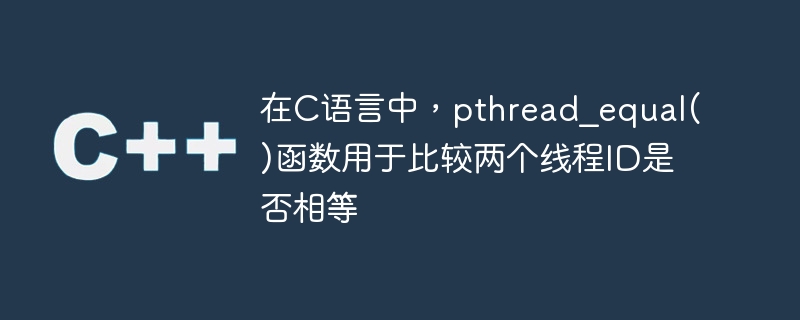

pthread_equal() function is used to check whether two threads are equal. It returns 0 or non-zero value. It returns non-zero value for equal threads, 0 otherwise. The syntax of this function is as follows:
int pthread_equal (pthread_t th1, pthread_t th2);
Now let’s see what pthread_equal() actually does. In the first case, we check the self-thread to check the result.
#include <stdio.h>
#include <stdlib.h>
#include <unistd.h>
#include <sys/types.h>
#include <pthread.h>
pthread_t sample_thread;
void* my_thread_function(void* p) {
if (pthread_equal(sample_thread, pthread_self())) { //pthread_self will return current thread id
printf("Threads are equal</p><p>");
} else {
printf("Threads are not equal</p><p>");
}
}
main() {
pthread_t th1;
sample_thread = th1; //assign the thread th1 to another thread object
pthread_create(&th1, NULL, my_thread_function, NULL); //create a thread using my thread function
pthread_join(th1, NULL); //wait for joining the thread with the main thread
}Threads are equal
Now if we compare between two different threads, we will see the result.
#include <stdio.h>
#include <stdlib.h>
#include <unistd.h>
#include <sys/types.h>
#include <pthread.h>
pthread_t sample_thread;
void* my_thread_function1(void* ptr) {
sample_thread = pthread_self(); //assign the id of the thread 1
}
void* my_thread_function2(void* p) {
if (pthread_equal(sample_thread, pthread_self())) { //pthread_self will return current thread id
printf("Threads are equal</p><p>");
} else {
printf("Threads are not equal</p><p>");
}
}
main() {
pthread_t th1, th2;
pthread_create(&th1, NULL, my_thread_function1, NULL); //create a thread using my_thread_function1
pthread_create(&th1, NULL, my_thread_function2, NULL); //create a thread using my_thread_function2
pthread_join(th1, NULL); //wait for joining the thread with the main thread
pthread_join(th2, NULL);
}Threads are not equal
The above is the detailed content of In C language, the pthread_equal() function is used to compare whether two thread IDs are equal.. For more information, please follow other related articles on the PHP Chinese website!




